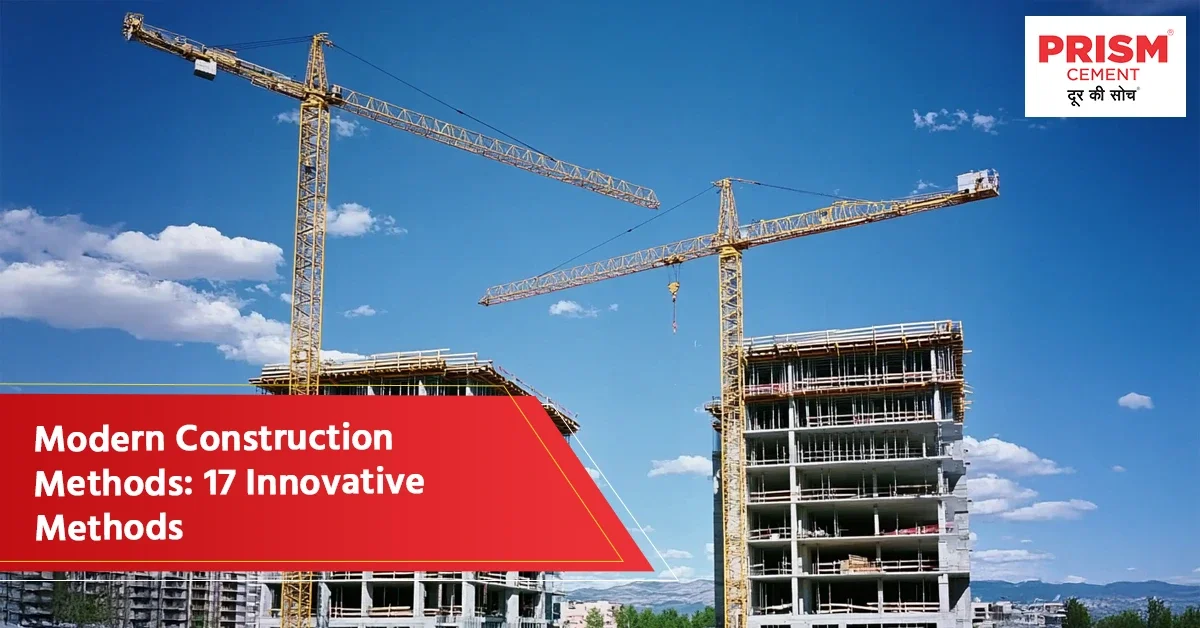
Construction has come a long way from traditional methods. Today, technology and innovation have revolutionized the way we build, making construction more efficient, sustainable and cost-effective. In this write-up, we'll explore 17 innovative construction methods that are shaping the construction industry.
This groundbreaking technology allows for the creation of complex structures layer by layer. Using specialized cement-based (cementitious) materials, 3D printing can produce customized and energy-efficient buildings.
Prefabricated modules are built off-site and then assembled on-site. This method reduces construction time, minimizes waste and offers greater control over quality.
Made from layers of engineered lumber, CLT is a strong, sustainable and aesthetically pleasing building material. It offers excellent thermal insulation properties and can be used for walls, floors and roofs.
This energy-efficient system uses earth's constant temperature to heat or cool buildings. By installing pipes underground, geo-exchange systems can significantly reduce energy consumption.
This approach involves coordinating all aspects of a project, from design to construction, to optimize efficiency and reduce cost. Building Information Modelling (BIM) software plays a crucial role in integrated construction.
This innovative material contains bacteria that can repair cracks by producing a mineral-rich substance. Self-healing concrete reduces maintenance cost and extends the lifespan of structures.
Robots can be used for several tasks, such as brick-laying, welding, painting, thereby improving accuracy, efficiency and safety on construction sites.
Sustainable materials, such as recycled steel, bamboo and reclaimed wood are gaining popularity. These materials reduce the environmental impact of construction and promote healthier living spaces.
Precast concrete elements are manufactured off-site and then transported to the construction site for assembly. This method can accelerate construction timelines and improve quality control.
These permeable fabrics are used to reinforce soil, filter water and protect structures from erosion. Geo-textiles are considered essential for projects, for example slope stabilization and landfill construction.
This high-performance concrete requires minimal vibration to achieve full compaction. Self-consolidating concrete is easier to place and can reduce labour cost.
Made from industrial waste products, such as fly ash and slag, geopolymer concrete is a sustainable and durable alternative to traditional concrete.
This method uses large-scale engineered timber components to create entire buildings. Mass timber construction offers excellent fire resistance, acoustic insulation, and carbon sequestration benefits.
Some components, such as windows, doors and plumbing fixtures can be manufactured off-site and delivered to the construction site for installation. This approach can improve quality control and reduce on-site work.
BIM software creates digital 3D models of buildings, allowing for better collaboration, coordination, and visualization. BIM can help identify potential problems early in the design process and reduce construction errors.
VR technology can be used to create immersive experiences of construction projects, allowing stakeholders to visualize and review designs before construction begins.
IoT sensors can be used to monitor construction sites, track equipment, and optimize resource allocation. IoT technology can improve safety, efficiency, and sustainability.
As the construction industry continues to evolve, these innovative methods will play a vital role in shaping the future of building. By embracing new technologies, sustainable practices, as well as high-quality building materials such as Prism Cement’s Prism Champion All Weather Cement, we can create more efficient, resilient, and environment friendly structures.
Prism Cement a division of Prism Johnson Limited is one of India’s leading integrated Building Materials Company, with a wide range of products from cement, ready-mixed concrete, tiles and bath products.
Prism Johnson Limited is an IMS Certified Company (ISO 9001:2015, ISO 14001:2015, ISO 45001:2018,SA 8000:2014 & ISO 50001:2018). Quality assurance is an integral part of Prism Johnson Limited manufacturing philosophy. The strength and other characteristics are much higher than the BIS requirements. Excellent quality has placed Prism Cement in the premium price segment.
KNOW MORE305, Laxmi Niwas Apartments, Ameerpet,
Hyderabad - 500016, Andhra Pradesh
![]() Tel: +91-40-23400218
Tel: +91-40-23400218
![]() Fax: + 91-40-23402249
Fax: + 91-40-23402249
"Rahejas", Main Avenue, V.P. Road,
Santacruz (W), Mumbai - 400054,
Maharashtra
![]() Tel: +91-40-23400218
Tel: +91-40-23400218
![]() Fax: + 91-40-23402249
Fax: + 91-40-23402249